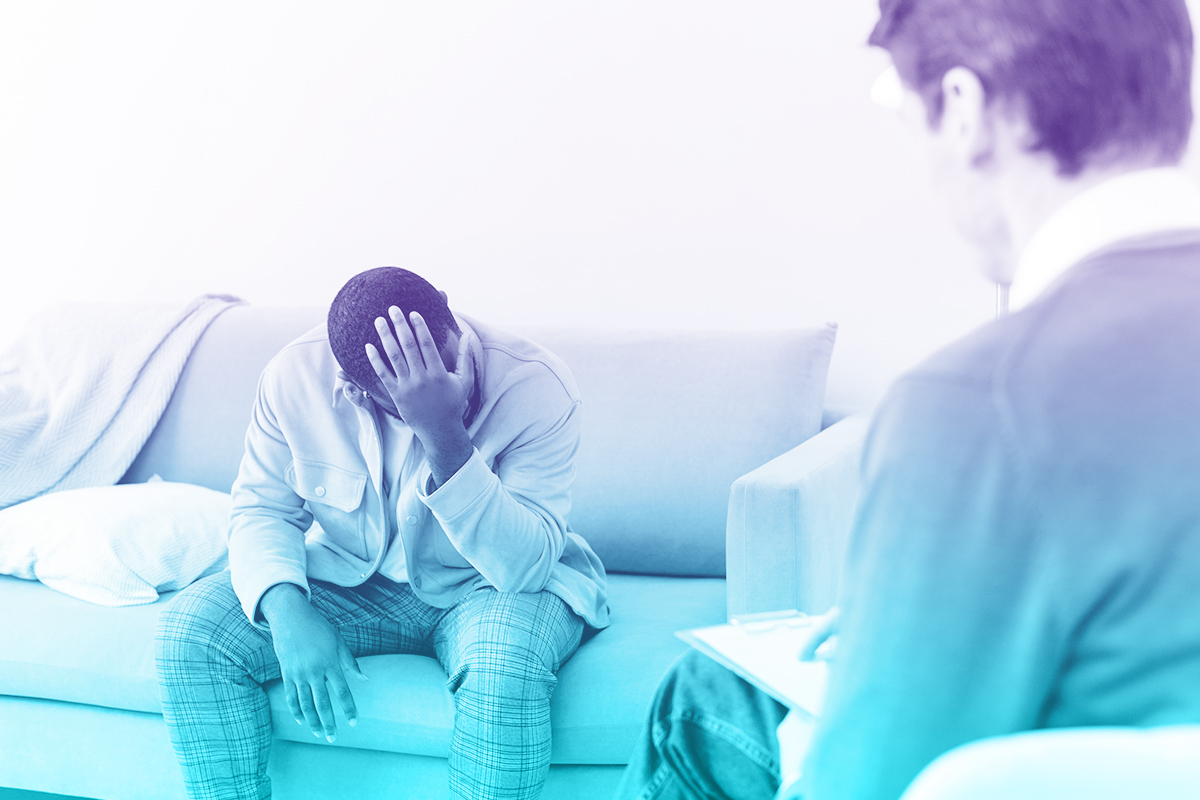Get Clean! Call us today!
PTSD Treatment
There is no timestamp on trauma. There isn’t a formula that you can insert yourself into to get from horror to healed. Be patient. Take up space. Let your journey be the balm.” – Dawn Serra
In 2020, 13 million Americans were diagnosed with post-traumatic stress disorder. This number is forever changing as people heal and no longer fit the diagnostic criteria. But at the same time, new diagnoses happen every day.
In the same year, over 100,000 Floridians reported domestic violence. This is only one example of a type of trauma that can result in PTSD, highlighting the need for treatment options.
Clean Recovery Centers not only treats substance use disorders but also mental health conditions such as post-traumatic stress disorder. No matter if substance use, PTSD, or both brought you to this page, we are here to provide a safe and welcoming space for healing to begin.

What We Treat: Understanding Post-Traumatic Stress Disorder
Post-traumatic stress disorder (PTSD) is a mental health condition that occurs after experiencing a traumatic event. It is common in veterans, first responders, and those who have experienced some form of abuse. Not everyone who experiences trauma will develop PTSD, however, those who do will benefit from treatment. This can include therapies and medications. Clean Recovery Centers has a dedicated team of specialists who treat trauma and PTSD.
How We Treat: Addressing the Intricacies of PTSD
Treating PTSD starts with trauma therapies which are specific to recalling the event and working to heal from it. Some therapies we offer at Clean Recovery Centers include rapid-resolution, cognitive behavioral, dialectical behavioral, and more. You will experience these therapies in both group and individual settings.
Our program is broken into three phases: preparation, action, and maintenance. Preparation consists of a medical detox and residential I stay. Those who are living with PTSD and a substance use disorder may start at this phase of treatment depending on their individual assessment.
Action is our residential II stay and consists of daily therapies and skill-building classes. You will learn about PTSD and trauma and how to move forward to begin healing. Here are some of the experiences you can expect during this phase at Clean Recovery Centers:
- Self-care techniques
- Psychospiritual therapies
- Anger management
- Self-esteem development
- Goal setting
- Meditation
- Mindfulness techniques
- Creative expressive therapies
- And more
Maintenance is gearing you toward transitioning back to your home life. You will have the tools needed to cope with stressful situations and no longer allow your trauma to hold you back. PTSD is complex, and you may need more time to heal than others. Our program adapts to your needs to ensure you receive the care needed to accomplish your goals.

Post-Traumatic Stress Disorder: What Causes It?
Post-traumatic stress disorder (PTSD) is a condition that occurs after experiencing a dangerous or scary event. These events are often traumatic, resulting in a fear response when met with things that remind you of the event. For some, traumatic events heal on their own and over time become less and less fearful. Others will continue to experience the fear response and have negative memories of the event, which results in PTSD.
PTSD is common in veterans, abuse survivors, and those who have lived through a natural disaster. Experiencing prolonged trauma increases the risk of developing PTSD. Anyone can develop PTSD at any age as trauma has no limitations.
Getting Diagnosed With Post-Traumatic Stress Disorder
As with any mental health condition, PTSD needs to be diagnosed by a medical or mental health professional. Those with post-traumatic stress disorder will experience symptoms that do not get better over time. These can vary between adults and children due to children’s minds still being in development. To receive a PTSD diagnosis, you must have experienced symptoms for at least one month to the point they interfere with your daily life.
PTSD Symptoms in Adults
PTSD symptoms for adults are divided into four categories: avoidance, re-experience, arousal/reactivity, and cognition/mood. A PTSD diagnosis will require experiencing one avoidance symptom, one re-experience symptom, two arousal/reactivity symptoms, and two cognition/mood symptoms all within the same month. Symptoms of each category include:
- Avoidance: avoiding places, objects, or people that remind you of the event, changing routines, and refraining from thinking about the event.
- Re-experience: having flashbacks of the event, having dreams or recurrent memories of the event, and showing physical signs of stress.
- Arousal/reactivity: being easily startled, having sleeping difficulties, experiencing angry outbursts, always feeling tense and in fight or flight, and engaging in reckless behaviors.
- Cognition/mood: forgetting details of the traumatic event, having constant negative thoughts and emotions, losing interest in hobbies and activities, and isolating socially.
PTSD Symptoms in Children
Older children and teens may see some of the same symptoms as adults, though they may have more extreme emotional reactions. Feelings of guilt and shame may be shifted into wanting revenge. They may be more disruptive or disrespectful, especially to those they feel should have protected them.
In younger children, trauma may cause them to revert to toddler-like behaviors. This includes bedwetting, losing the ability to talk, being overly clingy to a parent or adult, and re-enacting the event. Like adults, children can also have flashbacks and nightmares about the traumatic event.
How Is Post-Traumatic Stress Disorder Treated?
PTSD is a complex condition and does not look the same for everyone. Some treatment plans will involve medications such as antidepressants, specifically selective serotonin reuptake inhibitors (SSRIs). These medications help with depression, anxiety, and concentration and are approved for the treatment of PTSD.
Therapy is the next component of treatment. Healing trauma does not happen overnight, and specialized therapies have been developed for this process. Rapid-resolution therapy (RRT) is a technique that utilizes guided imagery, hypnosis, and different types of communication to resolve negative thoughts, emotions, and behaviors. RRT addresses ongoing concerns with trauma to promote long-term healing. Clean Recovery Centers has certified rapid-resolution therapists available at each of our locations.

PTSD Treatment for Veterans
Veterans have unique needs when it comes to healing trauma as they have seen situations civilians could never think of. It is extremely common for veterans to develop PTSD, and enrolling in a program as soon as they return to civilian life can help prevent its severity.
Talk therapies such as cognitive behavioral therapy (CBT) are common methods of treatment for veterans with PTSD. The goal of CBT is to recognize negative thought and behavior patterns and change them into positive ones. This is especially helpful for veterans with PTSD as it gives them a safe space to talk through their experiences while working to heal. Clean Recovery Centers has a dedicated team of therapists who specialize in CBT and other talk therapies.
Getting Treatment for PTSD at Clean Recovery Centers
Experiencing trauma is painful, and even more so when it turns into PTSD. The memories can seem to haunt you, taking your mind away from your friends and family. There is hope, and healing is possible with the right help. Mental health treatment is crucial to your overall well-being, and all it takes is making that first step. Through therapy and medication, you can put the past behind you and overcome your PTSD.
If you or someone you love is experiencing PTSD, help is available today. Clean Recovery Centers offers an expert team of compassionate professionals to aid in your mental healing journey. Each of our locations offers housing, so you will never have to worry about where you will be staying. Our program also offers co-occurring treatment options for those living with PTSD and substance use disorder. Call us today at (888) 330-2532 to learn more about our program offerings.
Get clean. Live clean. Stay clean.
FAQs About PTSD Treatment
Can you self-treat PTSD?
There are ways to help with PTSD symptoms on your own. Practicing breathing techniques can help relax you when thoughts become overwhelming. Ensuring you are getting enough sleep can help keep your mind at ease. Exercise can be a good way to stay active and keep your mind focused. However, if your symptoms are worsening or these techniques do not help, seek treatment options from a medical professional.
